Feature Farm of the Month:
New Leaf Urban Farmers
By Kevin Wallace, Grower at New Leaf Urban Farmers
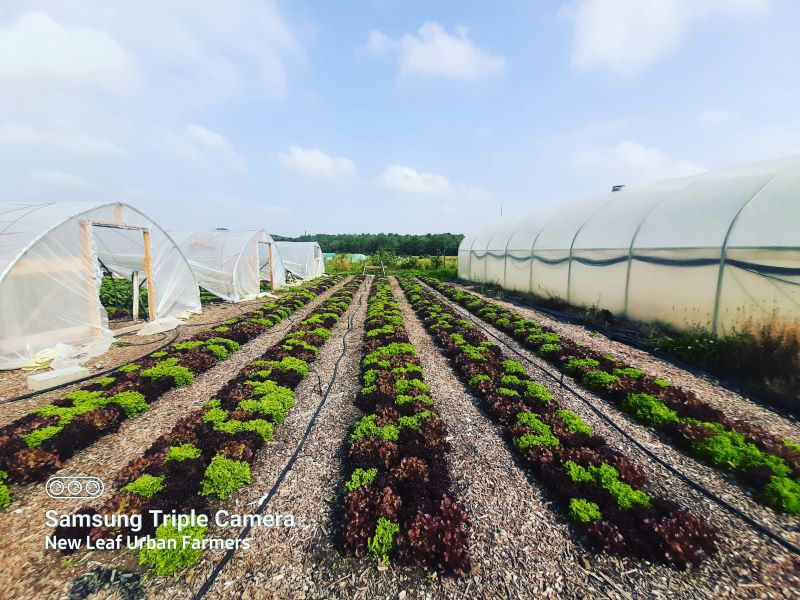
New Leaf Urban Farmers was established in 2016. We are a market garden of 1.5ac based in Ballyneety, County Limerick. We grow and supply specialist vegetables and leafy greens to the hospitality sector and also online with Neighbour Food Limerick.
Our micro-farm has developed over the past five seasons both in methods and practices. From low-till to no-dig to eventually arriving at, what we feel is the zenith of farming practices, Korean Natural Farming (KNF & JADAM). We use no machinery, just hand tools and we no longer crop rotate. All our inputs are made from ingredients sourced on the farm and in the surrounding hills. The sole function of the farm can be distilled down to soil management practices. We firmly believe that creating a richly diverse microbial ecosystem underpins plant health and soil vitality.
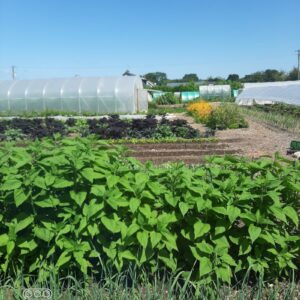
By incorporating Korean Natural Farming (KNF & JADAM) techniques we negate the proliferation of soil borne pathogens, as well as, create soil resilience to our changing climate and production needs. KNF is an elegant form of farming practised through observation of the natural world and utilising its strengths. We achieve this by culturing a diverse range of indigenous soil microbes and adding them to the soil. Above ground we observe each crop and tailor its nutritional requirements to each stage of its growth cycle. Coupled with these nutrients are also a probiotic and a five herb prebiotic. Moreover, we also incorporate fermented edible medicinal plants such as comfrey and nettle, harvested when their auxin levels are high, to enhance the plant’s development.
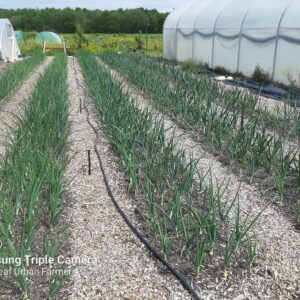
Since adopting KNF practices, our production levels have risen significantly through the reduction of pests and diseases. In terms of leafy greens production; grey mould, aphids and lettuce drop have been contained in some cases and eliminated in others. The quality of our overall produce has risen, with customer feedback being consistently positive. We feel the reason for this is that our soil is microbially balanced for the crops we grow, leading to healthier and more nutritious produce for our customers and ourselves.
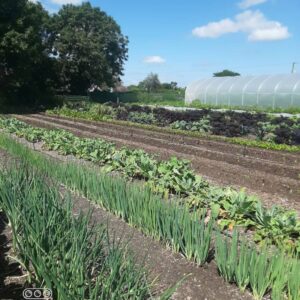
We use a range of hand tools and the paperpot system. I am prefer tools and equipment which are not petrol or diesel dependent. I usually look for hand held tools but there are other tools like the paperpot transplanting system which has become an essential system for seeding and transplanting. Without waxing lyrical about it, it is basically a system which massively reduces transplanting times as well as seeding times. In conjunction with this is the ability to accurately predict seed, compost and vermiculite usage and amounts. This may seem peripheral but a paperpot tray can take the space of three 84-cell trays. It also uses approximately 2/3 less compost by comparison. By saving on compost and space at critical times of the year it makes it a very efficient system to incorporate. Moreover, the labour saving is also significant as it can transplant a wide range of crops in very little time comparatively. There is now a hemp paperpot chain which degrades quickly in the soil. We use a mix of protected and unprotected spaces on our area. We have, currently, five polytunnels and a sixth ready to be installed (when I get the chance to do it). This equates to about 10,000 ft2. Three tunnels are caterpillar tunnels I retrofitted from used nursery tunnels. The tunnels are 14ft x 100ft. Caterpillar tunnels allow for their covers to be removed at the end of the season. Their primary advantage over static tunnels is that they can be moved, relatively easily, to other areas of the farm, if required, and set up quickly. Two people can do the work in a few hours.
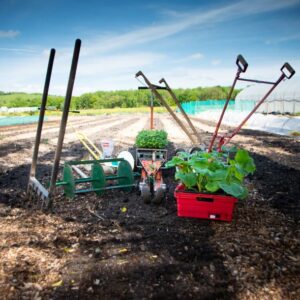
Each year we plant bee and predator friendly plants to encourage a more diverse range of insects and their predators to the farm. We feel that by diversifying both the soil micro-organisms and insects above ground we creating a more natural system whereby populations are naturally maintained. We have noticed slug and aphid populations, in particular, reducing over time.
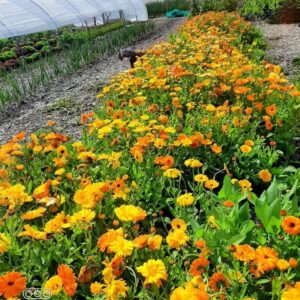
Over Christmas I bought a new microscope so that I can look at soil samples as well as looking at my IMOs (indigenous micro-organisms) to help me understand, in a very small way, the condition of my soil and the biological inputs I make. I am also working with my local university to form a symbiotic relationship (pardon the pun) whereby tests can be conducted on my inputs such as DNA sequencing on fungi. This, I am hoping, will guide me to capture better microbial collections as well as provide quantifiable data in an Irish context. From collection to transfer to the soil. I am convinced that soil microbiology, in the future,will be a key component of any farmers toolbox. A researcher microscope costs about €500-€600. For that price, any person can begin their own experimentation. The internet is now filled a vast array of subjects, lectures, courses and peer-reviewed articles on any subject. Facebook (for all its flaws) contains some really good farming groups. The concept of peer-sharing is a powerful one as it allows people to learn at their own pace. Moreover, it’s free…
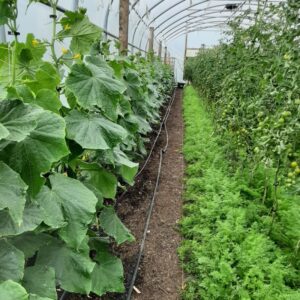
Considering the future of our natural world and what our children and grandchildren will inherit, and inhabit, I feel that we as farmers or soil stewards must do what we can to improve our land. This can come in many forms, be it on a permaculture basis or through direct soil management techniques like Korean Natural Farming or any other methodology which seeks to improve our soil and our shared environment. This means farmers, of all types, striving to become more independent, relying less on imports or the middle-man when we are all in, relatively speaking, the same situation, trying to feed ourselves and our communities as well as preserving our lands for future generations.

New Leaf Urban Farm is based in Ballinagarde, Ballyneety, Co. Limerick, V94 049W.
Email: newleafurbanfarmers@gmail.com
Website: https://www.newleafurbanfarmers.com/

I would love to go visit your farm, is it possible to drop by or do you have to be part of an organised group?
Hi Christina. Hope you enjoyed the blog piece by New Leaf Urban Farmers. Kevin Wallace is the grower at this farm. You can get in touch with him to query about farm walks at newleafurbanfarmers@gmail.com. All the best 🙂